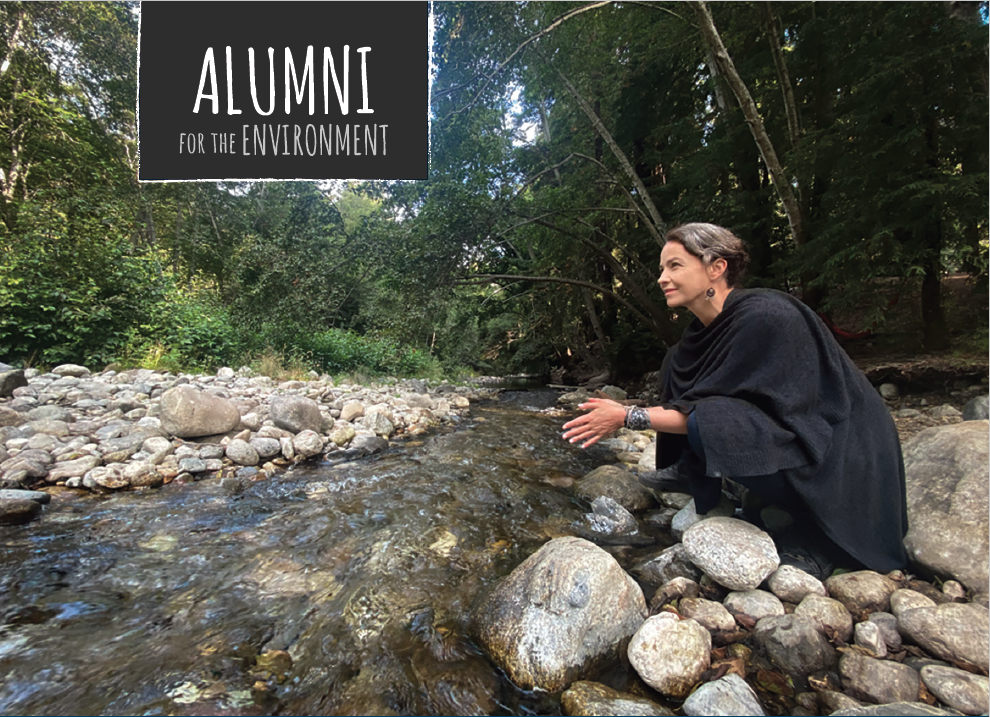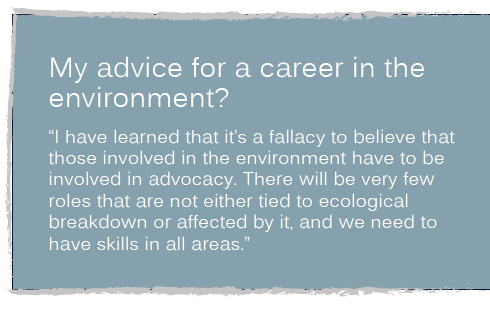
In a presentation to the American Society of Engineering Education a few years ago, Dawn Danby brought out her bristol board presentation from Gerry Bird’s 1993 Grade 10 environmental science class at Lakefield College School to make her point.
“My point was that his class at LCS was more sophisticated than most of the sustainability education required or available to young engineers at the university level,” she says. “This course was not just about ecology but about the politics of extraction. We looked at the political structure of OPEC (Organization of the Petroleum Exporting Countries), how nuclear reactors are built, and we did field trips to Pickering, a coal power plant and the GM plant in Oshawa. The takeaway was that the solutions to complex problems, like climate change, are also complex.”
Dawn is a design strategist with a strong focus on ecology and co-founder of Spherical, a research and design studio in Oakland, California. She works with a lot of engineering firms, city administrators and non-governmental organizations on wide-ranging projects encompassing everything from software technology to water systems in drought-challenged southern California. Those projects are especially important to her. “If we don’t get water systems sorted out, it will be very hard for millions of people to work, eat and live.”
Growing up, as she says, “obsessed” with rainforest destruction and destroyed landscapes, Dawn “went into design to reduce the negative effect of how we manufacture, build and extract resources using less energy, less materials.” She did that and found it to be good and necessary work, but Spherical adds another layer. “We wanted to be more inclusive of efforts to regenerate and heal living systems from the effects of manufacturing, building and extracting.”

Given her early environmental concerns, Dawn was a prime candidate for Lakefield’s outdoor-oriented program and philosophy. “Being out in the world meant being out on the land at Lakefield,” Dawn recalls. “The attention to environmental education was outstanding.” It fueled her commitment but also her fears. “It fired me up but it was also scary. It’s very hard for people to take it all on emotionally.”
After leaving Lakefield, Dawn’s journey began by studying design at the Rhode Island School of Design (RISD), an “instinctive decision” she says came from her desire to draw on her skills in creative arts and “making.” Happily, her studies broadened her sense of what creative work could encompass.
“Design is adjacent to engineering, and these are crucial areas in the modern economy,” Dawn says. “There are decisions about what gets made, and how, and with what specifications and materials. I learned how broad and complex the creative industries are.” At Spherical, she can take it another step further. “We address sustainability and regeneration,” says Dawn. “We do research with people and entire sectors. If it’s electronics, where do they come from, where do they go? We’re looking at systems.”
Following her degree at RISD, Dawn spent two years with a design firm specializing in green buildings in Austin, Texas, before heading to a design studio in Toronto that worked with landscape architects to incorporate living systems into water purification technologies.
One of the obstacles to overcome in environmental industries is the impression among would-be clients and decision-makers that sustainability is a frill, or a cost that can be subjugated to higher priorities. “It was hard to get people’s attention with the sustainability argument,” Dawn recalls. Recognizing a gap, Dawn enrolled in the MBA program in sustainable business at the Bainbridge Graduate Institute in Seattle (now the Presidio Graduate School).
“An MBA teaches you how to make a case, how to get heard, gain power and not get marginalized,” says Dawn. “It helped me take what I was doing and be taken seriously by those who make decisions, particularly about money and finance as well as engineering and technology.”
With a new ability to “find harmony between economic efficiency and sustainability,” Dawn set out in a new direction running sustainability design initiatives for AutoDesk, the primary provider of 3-D design software for the architectural, engineering and construction industries. “My projects were concerned with helping these industries in the earliest stages to design efficient buildings with a better understanding of the investments they were making.”
After a decade in that role, Dawn was ready for her current challenge with Spherical. With environmental awareness steadily on the rise, she encourages those starting out in the industry not to accept the default narratives and to constantly update their knowledge and widen their approach.
“I’ve noticed over the years that many people have never thought about this stuff,” she says. “But everything is changing so fast, even within our industry. No matter your vocation, you will have to cope with the impacts of climate change, so there’s centuries of work to be done.”
Written by: John Southerst
